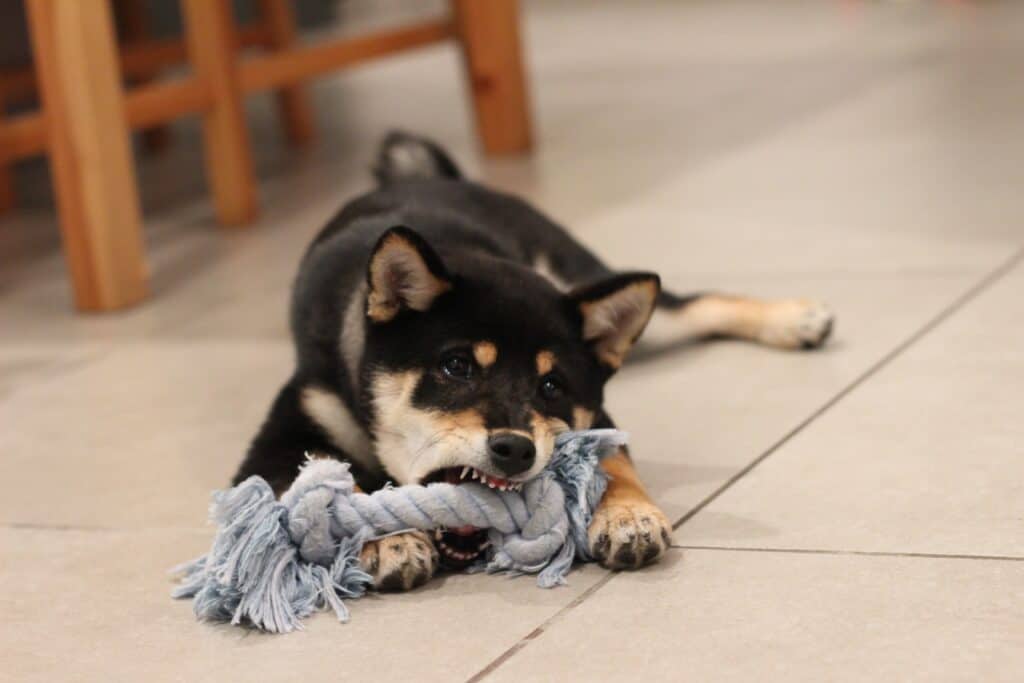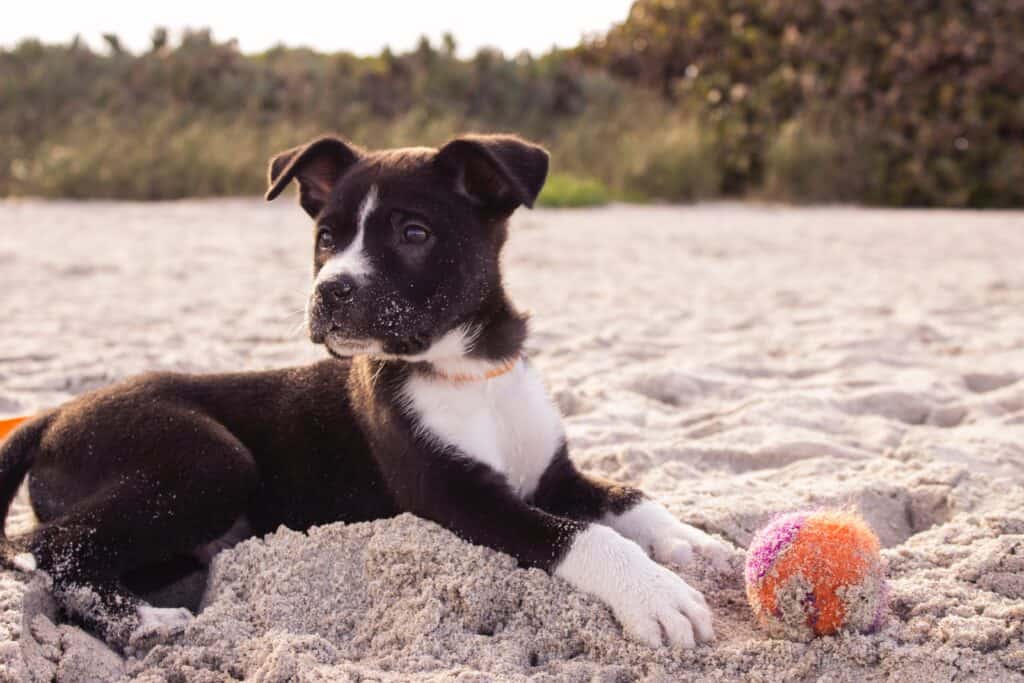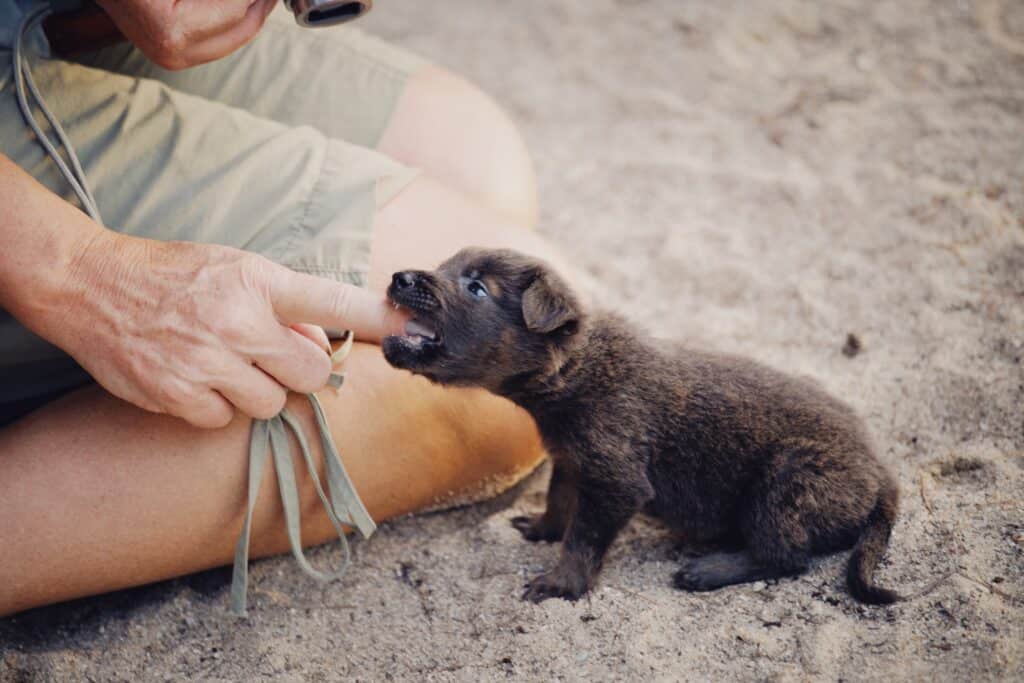How To Stop Puppy From Biting , Mouthing, and Nipping
How to stop puppy from biting and nipping ? You may ask, puppies frequently engage in play, chewing, and exploration, which require the use of their mouths and sharp teeth. During playtime with humans, puppies have a tendency to chew, bite, and mouth on hands, limbs, and clothing. While this behaviour may seem adorable at seven weeks of age, it becomes less endearing if a 3 month old puppy won’t stop biting.
How to stop puppy biting & Mouthy Behaviour
Assisting your puppy in curbing their mouthy behaviour is crucial. There are different methods, some more effective than others, to impart this lesson. The primary aim is to train your puppy to entirely stop mouthing and biting individuals. Nonetheless, the initial and most significant goal is to educate them on the fact that human skin is highly delicate, and thus they must exercise great care when utilizing their mouth.
Teach your Puppy to be Gentle by Practicing Bite Inhibition
When it comes to dogs, bite inhibition is their ability to control how hard they bite when mouthing. If a puppy or dog hasn’t learned how to inhibit their biting with humans, they may not understand that human skin is sensitive and can bite too hard, even when playing. Some trainers and behaviourists believe that if a dog has learned to use their mouth gently when interacting with people, they’ll be less likely to bite too hard and break the skin in situations where they’re afraid or in pain, for example.
During play with other puppies, it is common for puppies to learn bite inhibition. A group of puppies at play will engage in chasing, pouncing, and wrestling while also biting each other all over. Occasionally, a puppy may bite his or her playmate too hard, causing the victim to yelp and stop playing. The offender is often surprised by the yelp and stops playing momentarily as well. However, both playmates typically resume the game soon after. Through this type of interaction, puppies develop the ability to control the intensity of their bites, allowing play to continue without causing harm. Since puppies can learn how to be gentle with one another, they can also learn this skill from humans.
During playtime with your puppy, it’s important to allow them to mouth on your hands. If your puppy bites particularly hard, give a high-pitched yelp and let your hand go limp. This will startle your puppy and cause them to stop mouthing you, at least momentarily. If yelping has no effect, you can say “Too hard!” or “No bite” in a stern voice instead.
Praise your puppy for stopping or for licking you and then resume play as before. If your puppy bites hard again, repeat the process no more than three times within a 15-minute period. If yelping alone doesn’t work, switch to a time-out procedure. When your puppy bites hard, yelp loudly and then remove your hand. Ignore your puppy for 10 to 20 seconds or move away for 10 to 20 seconds if they start mouthing on you again. After the time-out, return to your puppy and encourage them to play with you again.
The goal is to teach your puppy that gentle play continues, but painful play stops. Play with your puppy until they bite hard again, and then repeat the sequence. When your puppy stops delivering hard bites, require them to be even gentler. Yelp and stop play in response to moderately hard bites and persist with this process until your puppy can play with your hands very gently, controlling the force of their mouthing so that you feel little or no pressure at all.

The next step is to Instruct your Puppy that Human Skin is not a Suitable target For their Teeth
When you’re puppy attempts to chew on your fingers or toes, offer a toy or chew bone as a replacement.
Puppies frequently nibble on people’s hands during petting, patting, and scratching, unless they are tired or unfocused. If your puppy becomes overly excited when you stroke him, divert his attention by giving him tiny treats from your alternate hand. This will help your puppy adjust to being touched without using his mouth.
It is recommended to promote non contact play activities, such as fetch and tug-of-war, instead of wrestling and aggressive play involving your hands with your puppy. Once your puppy can safely engage in tug-of-war, keep tug toys handy in your pocket or easily accessible. In case he starts to mouth you, you can quickly divert his attention towards the tug toy. Ideally, he will develop a habit of seeking a toy when he feels like mouthing.
Ensure a generous supply of captivating and novel playthings to divert your young dog’s attention from nibbling on your garments or body.
It is essential to offer ample chances for your puppy to interact and engage with other puppies and well-behaved adult dogs who have received their vaccinations. Socializing and playing with other dogs can significantly contribute to your puppy’s growth and development, and if your puppy utilizes most of their energy playing with other pups, they will be less inclined to play roughly with you. You may want to consider enrolling your puppy in an excellent puppy class program, where they can enjoy monitored playtime with other puppies and also learn valuable new skills.
This is how to stop a puppy from biting your feet and hands, keep his favourite tug toy with you at all times. When he attacks, stop moving and bring out the toy to entice him. Once he takes the toy, begin moving again. If you don’t have the toy, stop and wait for your puppy to stop biting. Once he does, offer praise and give him a toy as a reward. Repeat these steps until your puppy learns to not go after your feet or ankles while you move around.
Implement a time-out protocol similar to the one previously outlined, with slight alterations. Instead of administering time-outs to your puppy for aggressive biting, issue time-outs each instance their teeth come into contact with your skin.
To prevent your puppy from biting, yelp sharply when their teeth touch you then walk away for 30-60 seconds. If they follow or continue to nip, leave them alone in a puppy-proofed room for the same amount of time. When you return, calmly resume previous activities with your puppy.
During time-out training, it is an option to keep a leash attached to your puppy and let it drag along the floor while you are present to supervise. This way, when your puppy mouths you, you can grab the leash and guide him to a calm area. Tie him to a post and face away from him for a brief time-out before untying him and going back to your previous activities.
If a time-out is not feasible or efficient, a taste deterrent is an option to consider. Prior to interacting with your puppy, spray the areas of your body and clothing that your puppy likes to mouth. If your puppy mouths you or your clothing, cease movement and wait for your puppy to react to the unpleasant taste of the deterrent. Praising your puppy profusely when he releases you is recommended. Apply the bitter taste to your body and clothes for a minimum of two weeks. After being disciplined by the bitter taste every time he mouths you for two weeks, your puppy will likely learn to restrain his mouthy behaviour.
Having patience and being understanding is important when it comes to dealing with playful mouthing behaviours in puppies and young dogs, as it is a normal behaviour for them.
Working with mouthing problems in dogs can be difficult. Therefore, it is recommended to seek assistance from a Certified Professional Dog Trainer. Like Royal Companion Kennels located in Toronto, great trainers and teachers on how to stop a puppy from biting and nipping.

Precautions should be taken when Dealing with Nipping, Biting, and Mouthing Behaviours.
To discourage your puppy from biting your hands and feet, refrain from waving your fingers or toes in their face or slapping the sides of their face to initiate play. These actions may actually prompt your puppy to bite you.
Avoid discouraging your puppy from playing with you in any way. Engaging in playtime helps to build a strong connection between a dog and their human family. Instead, focus on teaching you’re puppy how to play softly, rather than not allowing them to play altogether.
To prevent your puppy from jumping and grabbing at you, refrain from abruptly pulling your hands or feet away when he mouths. Instead, it is more effective to allow your hands or feet to go limp, making them less enjoyable to play with.
Hitting or slapping a puppy for playful mouthing behaviour may result in them biting harder. This may cause the puppy to react more aggressively during playtime. Physical punishment can also lead to fear and real aggression towards the owner. To prevent these negative outcomes, it is recommended to avoid punishments such as scruff shaking, nose whacking, and putting fingers down the puppy’s throat, as they can cause pain and fear.
At what Point does my puppy biting Transform into Aggression?
Typically, puppy mouthing is considered to be a regular behaviour. Nevertheless, certain puppies may bite due to fear or frustration, which may indicate potential aggression issues in the future.
do this if your Puppys Tantrums are a Common Occurrence
Puppies can experience temper tantrums. These outbursts often occur when you force your puppy to do something that he dislikes, such as holding him still or handling his body.
Tantrums may also occur when play becomes too intense. It can be difficult to differentiate between a playful mouthing and a serious puppy temper tantrum. Generally, a playful puppy will have a relaxed body and face with only slight wrinkling of the muzzle and no visible tension in the facial muscles. However, if your puppy throws a temper tantrum, his body may become very stiff or frozen, he may pull back his lips to reveal his teeth, and he may growl. His bites during this time will usually be more painful than normal play mouthing.
If your puppy throws a temper tantrum while you’re holding or handling him, avoid yelping as if you’re hurt, because it can worsen his aggressive behaviour. Instead, remain calm and composed, and don’t harm your puppy. Keep holding him firmly without squeezing, if possible, until he stops struggling. Once he has quieted down for a moment or two, let him go. Then seek help from a qualified professional. Your puppy’s repeated biting in frustration is not something he will naturally outgrow, so his behaviour needs to be evaluated and resolved right away.

